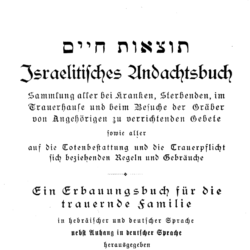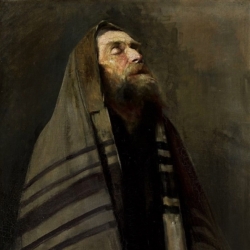The Kaddish prayer is used to mark major divisions in the service. (As an incredibly brief summary: the half-Kaddish marks a break before a service, the full Kaddish marks the end of a main service, the kaddish d’rabbanan marks a break after study, and the mourner’s kaddish does everything else.) The Kaddish is a classic doxology, a prayer that repeats the praises of God and serves as a summary and conclusion of what has been said before. It is in Aramaic, the language of the community, and it is call and response. Many a mourner is aware of the pain that can come when one shows up to say kaddish and they can’t make a minyan.
The Yemenite Baladi community has a custom of reciting a passage they call the Brikh Shmeh d’Kudsha Brikh Hu when praying without a minyan. It is an abbreviated form of the Kaddish without any of the call and response passages, and features singular terminology. It fulfills the same role of division and doxology as the regular Kaddish does, but on a smaller, more personal scale. Their text is based on their own version of the Kaddish, though, which differs substantially from other communities’ versions.
This text takes the basic idea of the Baladi-rite ‘Brikh Shmeh d’Kudsha Brikh Hu‘ and adapts it for the Askenazi nusach of the Kaddish. It can be used when praying alone wherever a minyan would say the entire Kaddish. It could also be recited by a community in unison out loud when it can’t make a minyan, to show that even if we don’t have a full minyan, we still welcome mourners as part of our community.
This is part one in a series of replacements when praying alone for the Askhenazi rite that the editor is submitting.
| Source (Hebrew) | Translation (English) |
|---|---|
בְּרִיךְ שְׁמֵיהּ דְּקוּדְשָׁא בְּרִיךְ הוּא (על ימים נוראים: לְעֵילָא,) לְעֵילָא מִן־כָּל בִּרְכָתָא שִׁירָתָא תֻּשְׁבְּחָתָא וְנֶחָמָתָא דַּאֲמִירָן בְּעָלְמָא׃ |
Blessed is the Name of the blessed Holy One, (during the Ten Days: high,) high above all blessings and songs, praises and comforts that we say in this world. |
תִּתְקַבַּל צְלוֹתִי וּבָעוּתִי עִם צְלוֹתְהוֹן וּבָעוּתְהוֹן דְּכָל־בֵּית יִשְׂרָאֵל קֳדָם אַבָּא דְּבִשְׁמַיָּא׃ |
May my blessings and pleas be received with the blessings and pleas of all the house of Israel before my Parent who is in heaven. |
יְהֶא שְׁלָמָא רַבָּא מִן שְׁמַיָּא וְחַיִּים עָלַי וְעַל כָּל־יִשְׂרָאֵל׃ עֹשֶׂ֥ה שָׁ֝ל֗וֹם בִּמְרוֹמָֽיו הוּא יַעֲשֶׂה שָׁלוֹם עָלַי וְעַל כָּל־יִשְׂרָאֵל׃ |
May there be great peace from heaven and life upon me and upon all of Israel. May the Maker of peace above make peace upon me and upon all Israel. |
אָמֵן וְאָמֵן כֵּן יְהִי רָצוֹן׃ |
Amen and amen, thus may it be Your will. |

“קדיש יתום בלי מנין או אם לבד (אשכנז) | Abbreviated, Personal Mourner’s Ḳaddish for when Praying Alone or Without a Minyan (Nusaḥ Ashkenaz), by Isaac Gantwerk Mayer” is shared through the Open Siddur Project with a Creative Commons Attribution-ShareAlike 4.0 International copyleft license.







Leave a Reply